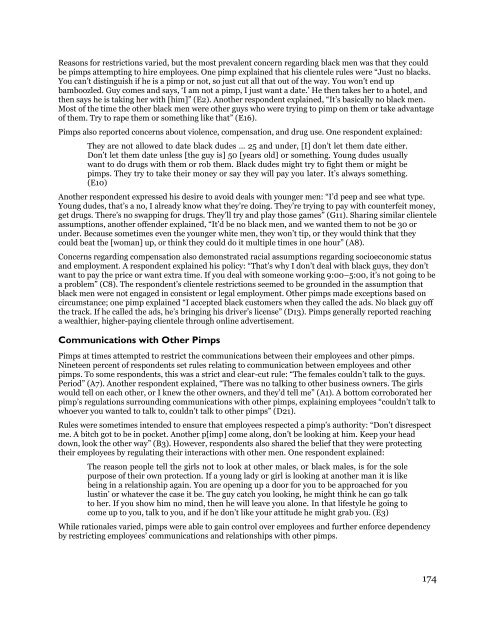413047-Underground-Commercial-Sex-Economy
413047-Underground-Commercial-Sex-Economy
413047-Underground-Commercial-Sex-Economy
Create successful ePaper yourself
Turn your PDF publications into a flip-book with our unique Google optimized e-Paper software.
Reasons for restrictions varied, but the most prevalent concern regarding black men was that they could<br />
be pimps attempting to hire employees. One pimp explained that his clientele rules were “Just no blacks.<br />
You can’t distinguish if he is a pimp or not, so just cut all that out of the way. You won’t end up<br />
bamboozled. Guy comes and says, ‘I am not a pimp, I just want a date.’ He then takes her to a hotel, and<br />
then says he is taking her with [him]” (E2). Another respondent explained, “It’s basically no black men.<br />
Most of the time the other black men were other guys who were trying to pimp on them or take advantage<br />
of them. Try to rape them or something like that” (E16).<br />
Pimps also reported concerns about violence, compensation, and drug use. One respondent explained:<br />
They are not allowed to date black dudes … 25 and under, [I] don’t let them date either.<br />
Don’t let them date unless [the guy is] 50 [years old] or something. Young dudes usually<br />
want to do drugs with them or rob them. Black dudes might try to fight them or might be<br />
pimps. They try to take their money or say they will pay you later. It’s always something.<br />
(E10)<br />
Another respondent expressed his desire to avoid deals with younger men: “I’d peep and see what type.<br />
Young dudes, that’s a no, I already know what they’re doing. They’re trying to pay with counterfeit money,<br />
get drugs. There’s no swapping for drugs. They’ll try and play those games” (G11). Sharing similar clientele<br />
assumptions, another offender explained, “It’d be no black men, and we wanted them to not be 30 or<br />
under. Because sometimes even the younger white men, they won’t tip, or they would think that they<br />
could beat the [woman] up, or think they could do it multiple times in one hour” (A8).<br />
Concerns regarding compensation also demonstrated racial assumptions regarding socioeconomic status<br />
and employment. A respondent explained his policy: “That’s why I don’t deal with black guys, they don’t<br />
want to pay the price or want extra time. If you deal with someone working 9:00–5:00, it’s not going to be<br />
a problem” (C8). The respondent’s clientele restrictions seemed to be grounded in the assumption that<br />
black men were not engaged in consistent or legal employment. Other pimps made exceptions based on<br />
circumstance; one pimp explained “I accepted black customers when they called the ads. No black guy off<br />
the track. If he called the ads, he’s bringing his driver’s license” (D13). Pimps generally reported reaching<br />
a wealthier, higher-paying clientele through online advertisement.<br />
Communications with Other Pimps<br />
Pimps at times attempted to restrict the communications between their employees and other pimps.<br />
Nineteen percent of respondents set rules relating to communication between employees and other<br />
pimps. To some respondents, this was a strict and clear-cut rule: “The females couldn’t talk to the guys.<br />
Period” (A7). Another respondent explained, “There was no talking to other business owners. The girls<br />
would tell on each other, or I knew the other owners, and they’d tell me” (A1). A bottom corroborated her<br />
pimp’s regulations surrounding communications with other pimps, explaining employees “couldn’t talk to<br />
whoever you wanted to talk to, couldn’t talk to other pimps” (D21).<br />
Rules were sometimes intended to ensure that employees respected a pimp’s authority: “Don’t disrespect<br />
me. A bitch got to be in pocket. Another p[imp] come along, don’t be looking at him. Keep your head<br />
down, look the other way” (B3). However, respondents also shared the belief that they were protecting<br />
their employees by regulating their interactions with other men. One respondent explained:<br />
The reason people tell the girls not to look at other males, or black males, is for the sole<br />
purpose of their own protection. If a young lady or girl is looking at another man it is like<br />
being in a relationship again. You are opening up a door for you to be approached for you<br />
lustin’ or whatever the case it be. The guy catch you looking, he might think he can go talk<br />
to her. If you show him no mind, then he will leave you alone. In that lifestyle he going to<br />
come up to you, talk to you, and if he don’t like your attitude he might grab you. (E3)<br />
While rationales varied, pimps were able to gain control over employees and further enforce dependency<br />
by restricting employees’ communications and relationships with other pimps.<br />
174


